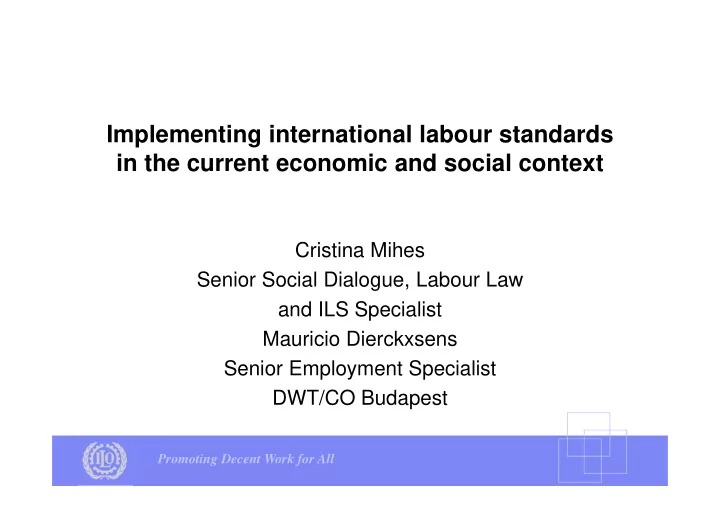

Implementing international labour standards in the current economic and social context Cristina Mihes Senior Social Dialogue, Labour Law and ILS Specialist Mauricio Dierckxsens Senior Employment Specialist DWT/CO Budapest Promoting Decent Work for All
Implementing ILS: a national and international added value • Sustainable and job-rich economic growth high on the EU MS agendas •Effective labour market governance is a sine qua non condition •Fundamental principles and rights at work enshrined in the Lisbon Treaty •ILS: founding and complementing the EU labour law Promoting Decent Work for All
The “economic case” of Freedom of Association and Collective Bargaining A) Benefits at macroeconomic level • Sound and harmonious industrial relations ensure social stability and build trust • Facilitate smoother and quicker adjustment to economic shocks • Secure stronger link wage-productivity on a longer term • Can reduce vulnerability and social exclusion Promoting Decent Work for All
The “business case” of FOA and CB (ctd) B) Enterprise performance • Pre-condition for social peace and sound employment relationships in the workplace • Effective management tool for workplace technological and organizational changes • Positively influence firm performance through enforcing labour-management agreements on working conditions, wages and productivity • Strike the balance between workers’ interest in employability and enterprise’s one related to competitiveness and flexibility • Balance worker’s interest over work/life balance with employer’s interest for flexible working time and reduction in overtime cost Promoting Decent Work for All
The “business case” of tripartite Social Dialogue • Can ensure a variety of perspectives on economic and social challenges • Can assist in designing reforms • Can assist in bolstering support for reforms by securing the commitment of EOs and WOs • Can prevent social unrest, avoid/divert damaging industrial action • Can reduce income inequalities and maintain social cohesion Promoting Decent Work for All
ILS in action • Collective agreements on working time reduction have helped to prevent/reduce lay-offs in SMEs: The British Trade Union Congress and the Federation of Small Businesses have jointly suggested the introduction of short-time working subsidies for around 600,000 workers per year with a replacement rate of 60 % of the income lost Promoting Decent Work for All
ILS in action (ctd) • Tripartite negotiations on the national Minimum Wage • Tripartite Economic and Social Council of the FYR of Macedonia has agreed on the national Minimum Wage level and made recommendation to Parliament which enacted the MW as recommended (2011) • Introduction of the Minimum Wage in Germany and the UK Promoting Decent Work for All
ILS in action (ctd) • Negotiating Flexible Time: Work-family balance plus business efficiency (C156) Employers Workers Reduced turnover Time for family Less absenteeism Time for other needs Higher productivity Job satisfaction Committed workers Less stress, better health Lower recruitment cost Willingness to invest in firm-specific skills Promoting Decent Work for All
ILS in action (ctd) • Devising and implementing work-family policies: childcare • Government funding the supply of childcare through subsidies, or loans or direct supplies: Sweden, Finland, Denmark, France, the UK, Korea, South Africa, Singapore • Government funding the demand by subsidies to parents: USA, Korea, UK, Australia • Mixed schemes to encourage employers to provide childcare support using grants or direct subsidies and/or fiscal incentives: Netherlands , France Promoting Decent Work for All
International Labor Standards in the current context, their role in promoting SME development Promoting Decent Work for All
Impact areas Internal factor favoring External factor favoring compliance compliance • From rent-seeking to value- • Longer lasting business adding relationship with large or • Compliance and cooperative international buyers workplace practices are a • Access to business support necessary ingredient of services modern management practices – Without a skilled an motivated workforce you won't be able to run these systems Promoting Decent Work for All
Is labour regulation a major brake on SME development? Promoting Decent Work for All
A short look at some conventions • Collective bargaining and SME’s • Collective bargaining, if done at sector level, reduces the time cost of each individual negotiation, plus frees time to pursue value-added activities • Discrimination • Asymmetric access to enterprise development services (financial or technical) because of gender or age, intentional or otherwise, hinders the potential for growth • Within-firm discrimination (Gender, age or disability) hinders cohesion and participation • Overuse of working over-time and gaps in employment contracts • Leads to loss of: energy, stability, upskilling and long-term goals • Inspection • Effect on productivity is related to how many and how complex inspections are, less so to the standard requested. Promoting Decent Work for All
Some evidence • Cambridge labour regulation index shows that trends in working time and employment protection law are positively correlated to growth in employment and productivity in France and Germany, respectively. • In the US, changes to dismissal regulation (WARN law) are correlated with lower employment growth but increased productivity growth • In the UK, there is no link to productivity or employment, but labour law deregulation negatively impacted on equality (Deakin and Sarkar 2008) • Increases in labour regulation as measured by the CBR index are positively correlated with innovation as measured by patent rates (Acharya et al. 2009) • In particular, employment protection and working-time laws can have positive impacts on productivity and employment growth, through their encouragement of training and innovation However , these positive effects may depend on the presence of complementary institutions in financial and product markets Promoting Decent Work for All
Recommend
More recommend